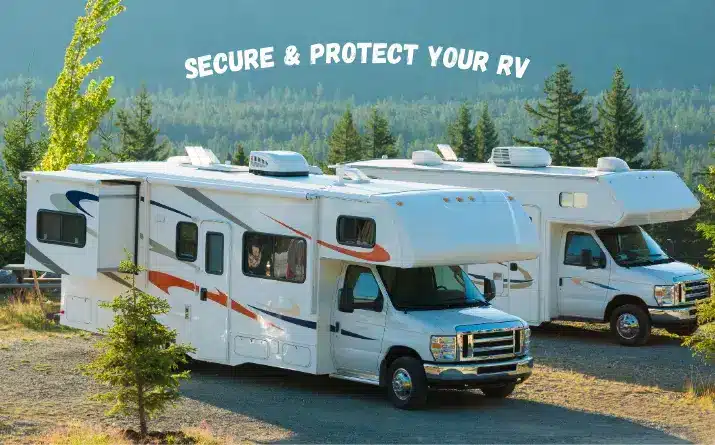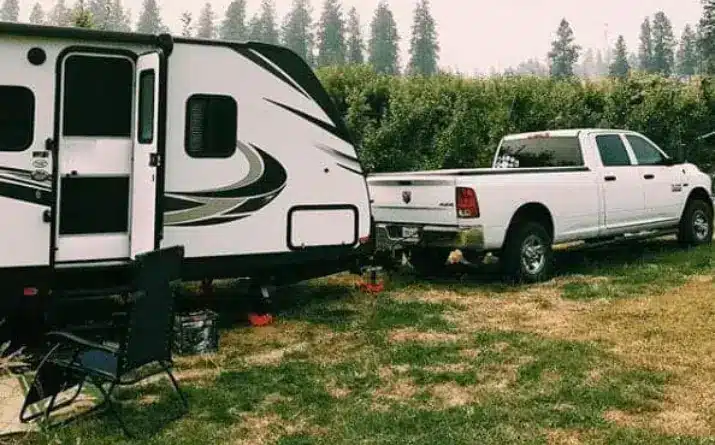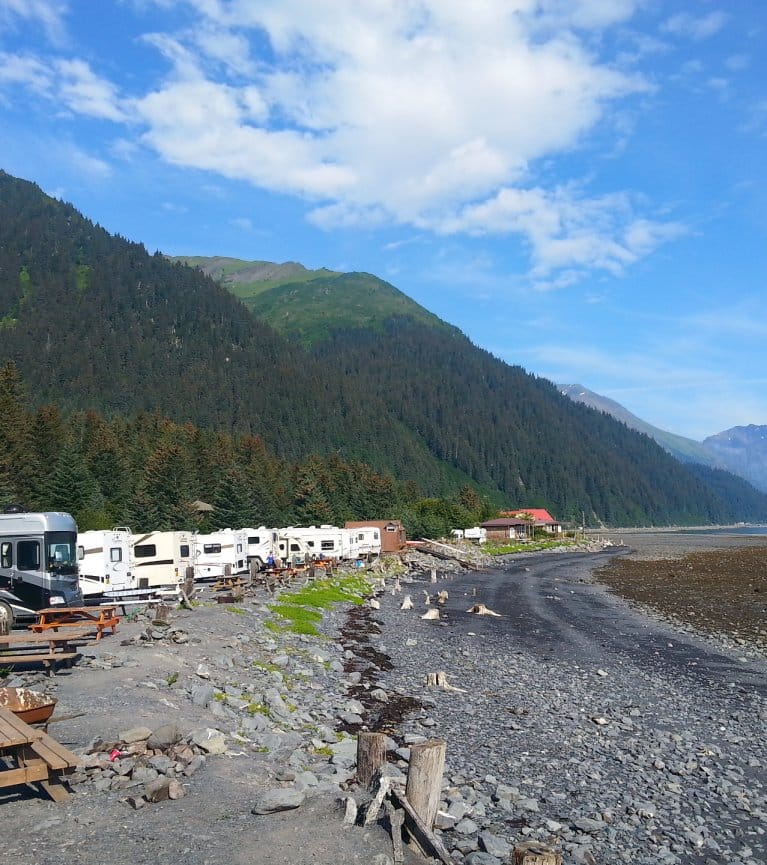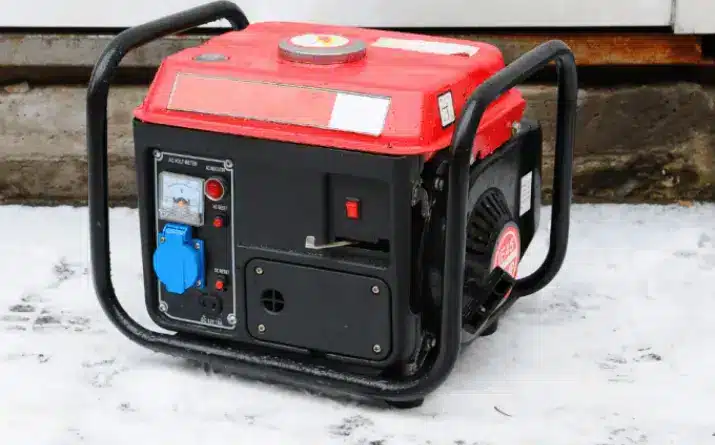Expert Tips to Turn RV Travel into Responsible Travel
If you’re an outdoor enthusiast who would like to learn how to turn RV camping into responsible travel, we have some great tips from the experts. It’s fairly simple and really only boils down to awareness and simple changes. Use less plastic, follow leave no trace principles, and recycle while on the road. In this article, we cover some great suggestions that are easy to follow and feel good to put into practice.
This is how RV experts travel to beautiful places and do what they can to be kind to the environment. We have also share some tips from companies who know a thing or two about this topic.
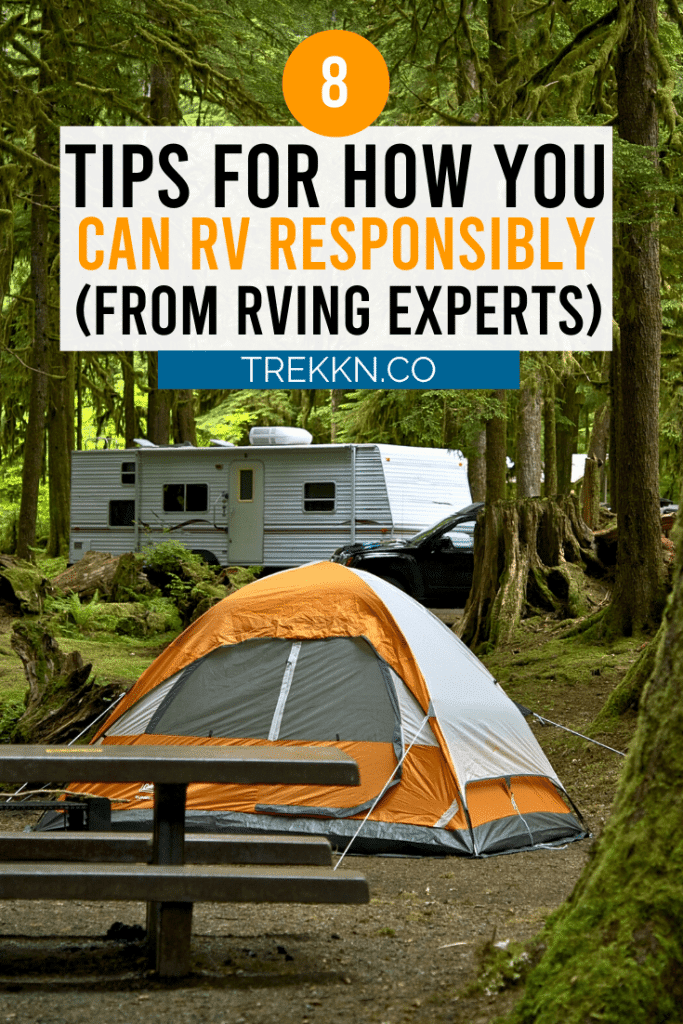
The Plethora of Advice We Received
It wasn’t that long ago that Todd and I were complete RV newbies. And when people found out we were about to hit the road full-time in our travel trailer with absolutely no experience, we received all kinds of advice.
Not only did we receive advice (some good, some not so good) we also received looks of concern, surprise and are you crazy?
Prepare for Amount of Trash You Could Make
Someone made a comment to Todd while he was getting the hitch installed on our RV. That comment stuck with me throughout our travels and I still think about it even though we recently took a break from full-time travel.
AVOID USING PAPER PLATES AND RECYCLE WHEN POSSIBLE
She said one thing we’re going to have to accept while on the road is the fact that we’ll be creating more trash than we’re used to in a home. She said we would produce more trash in general and use more paper products, in particular. That was something we would just have to deal with.
I not only thought that was a very interesting comment, but I also thought that surely there was a way to be more environmentally responsible while we traveled. It was a good comment to hear because we made an effort from the start to be mindful of using paper plates. We also took advantage of recycling at RV parks.
Responsible Travel Is a Trend that Continues to be Important
What got me thinking about this topic again was an article I read. It stated said that being more environmentally responsible while we travel would be a big trend for the upcoming year.
I think this is a great topic for RVers and for companies who embrace responsible travel.
8 Tips for Responsible RV Travel
1. Reduce Footprint with an ebike
How do you get around the RV campground and the nearby city streets when you RV? We had one bike with us for our teenager, but that was it. There were definitely times we wish we had another mode of transportation other than our massive truck.
When we traveled by RV to California we stopped in Santa Barbara for a day. We rented a Surrey to get around. Not only was it an absolute blast, but it was also so nice to leave the truck where it was parked. I loved exploring and enjoying parts of the city by bike.
Related Reading: What to Do in Santa Barbara in One Day
USE BIKES OR EBIKES TO RUN ERRANDS AND SEE SIGHTS
The RV community is one of the largest customer bases of Blix Ebikes. The company is located in Santa Cruz, California and they state that many RVers choose to bring electric bikes on their travels. Once they reach the campground, they can leave their car behind and use the Ebike to get around.
This helps reduce their fuel use (and expense) and lowers their carbon footprint while RVing.
With an ebike, you can head to the grocery store, go into town, and explore the area without leaving a trace of gas emissions.
2. Making Changes to Get the Best Gas Mileage Possible
If you ask RVers what one of the highest expense is while traveling, they will without a doubt tell you it’s the cost of fuel.
This was a huge expense for us and we always kept an ear out for any tips on how to improve fuel efficiency and save money at the pump.
Related Reading: Simple Ways to Reduce the Cost of Full-Time RV Life
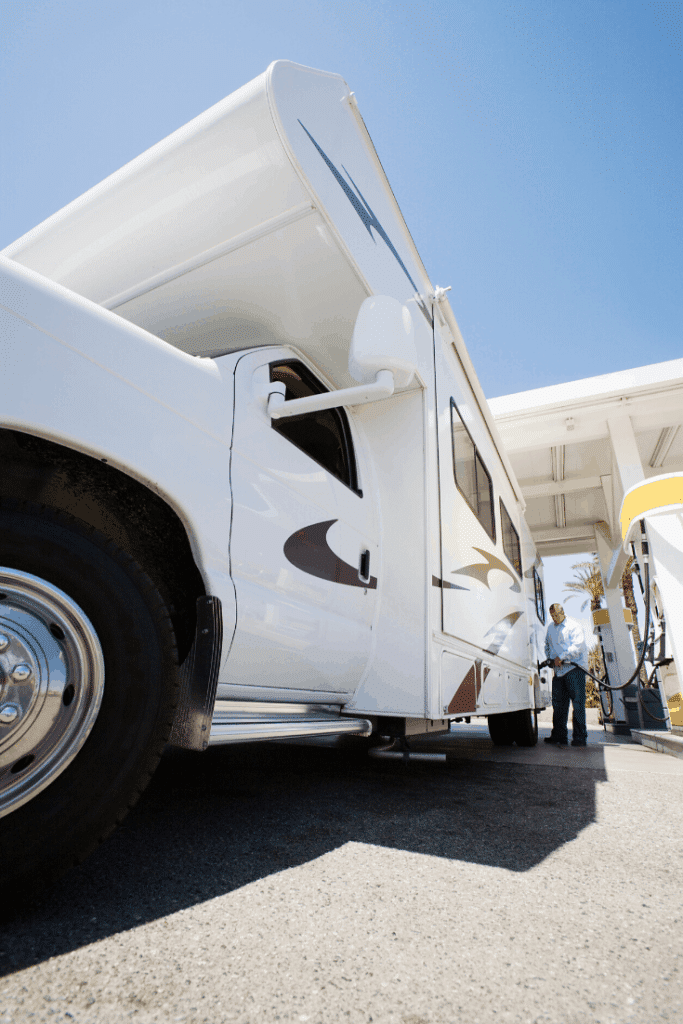
Michael from the site RVBlogger shares:
“One way that Susan and I try to reduce our carbon footprint is to get the best gas mileage possible while driving our 2008 Gulf Stream Conquest Class C RV.
MAINTAIN TIRES TO MAXIMIZE FUEL EFFICIENCY
We accomplish this goal by making sure our tires are properly inflated. In addition, I drive with a different attitude than when I drive my car.
I learned this new driving style from a trucker who makes his living driving big rigs. He is meticulous about getting the best gas mileage possible because it cuts his fuel cost significantly over the course of a year.
ADJUST DRIVING STYLE TO IMPROVE MPG
Here are 2 simple steps I learned from him.
1. Drive as though you don’t have brakes! I guarantee it will change the way you drive! I make a game of it when I drive. This attitude forces me to drive smarter, slower and I have to look further down the road for brake lights so I get off the gas much sooner. I also drift much further when approaching traffic lights, brake lights, stop signs and curves in the road. This one tip will increase your gas mileage!
2. Use the gas peddle wisely. You should only accelerate when you are preparing to go up a hill, when you are coming out of a turn or if you are at a complete standstill. Other than that just use enough gas to drive the speed limit and never exceed 55 mph. It took me a while to get used to not stomping on the gas peddle to accelerate like I would in a car. But ultimately it makes a big difference in your gas mileage.
Those are the two big changes I have made. And when I am mindful, I can actually increase my gas mileage by 2 to 3 miles per gallon.”
3. Install RV Water Purification and Eliminate Plastic Trash
Water purification and filtration is a big topic among RVers. We all want clean, great-tasting water. On top of that, we want to reduce the use of plastic water bottles.
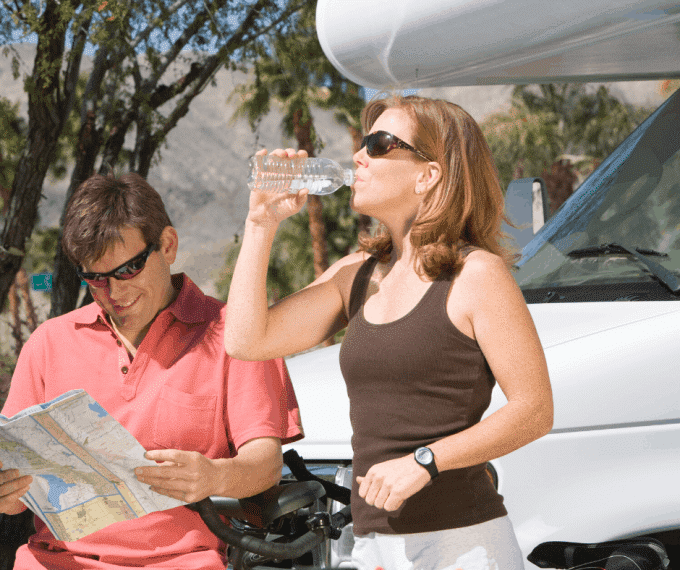
Tyler Bech from Guzzle H2O shares, “A great addition to an RV to reduce your environmental footprint is to have some kind of water filtration and purification device onboard. This way you can eliminate using plastic bottled water for hydration. This massively cuts down on trash, and plastic takes hundreds of years to deteriorate. In the meantime, it shows up everywhere as microplastic pollution.”
I love Guzzle H2O’s slogan which is “Pure water. No trash.”
Related Reading: Your Best Options for RV Water Filtration
4. Dump Your Water Tank Before Travel
While packing up our travel trailer to hit the road full-time, one thing we had to stay on top of was the weight of our rig. So we were very selective when it came time to packing things like books, shoes, and tools.
Another heavy item RVers have to stay aware of while traveling is the tanks. Unless you’re heading to a boondocking spot and plan to stay a while, you do not want to travel with a full water tank.
Related Reading: What is Boondocking?
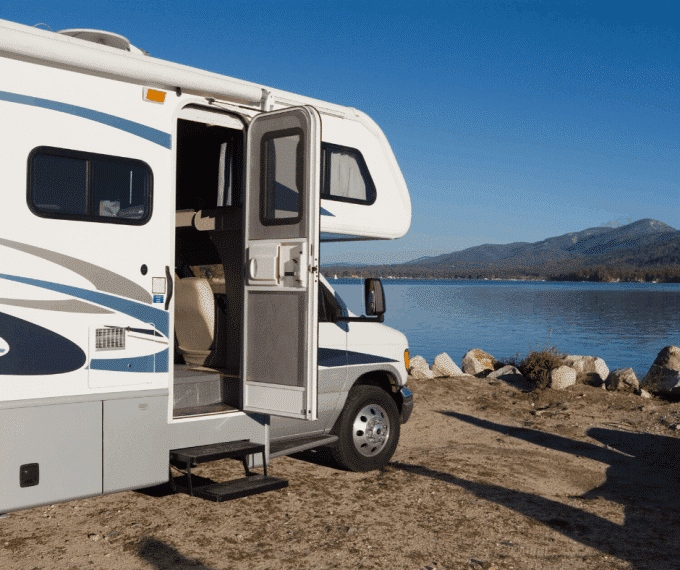
Anne Keery from AspiringWinos shares, “One of the struggles with being a responsible RVer is the environmental impact of pulling so much weight on the highway. One of the ways to get a win-win situation, which also helps with your fuel bill – bonus! – is to dump your water tank prior to returning home.
“However, to avoid wasting all of that potable water on the road, talk to the RV campground manager to see if there’s somewhere they could use the water. Many places have flower beds, grass fields, water features or even animal troughs for horses, etc, that would love a donation of your freshwater.
“If you are dry camping, take a look at the area and find a strategic place, perhaps watering some nearby trees. Strategic dumping is great for the RV community, the planet, and your wallet.”
5. Install Solar Panels
One question we are often asked about a full-time RV lifestyle is what we would do differently. My response is to tour more wineries and food joints (priorities, am I right?). Todd’s response is always the same. He would install solar on our rig. Why is solar such a big goal for Todd?
Jake Lane, who is director of growth for NuBrakes Mobile Brake Repair, understands the benefits of solar.
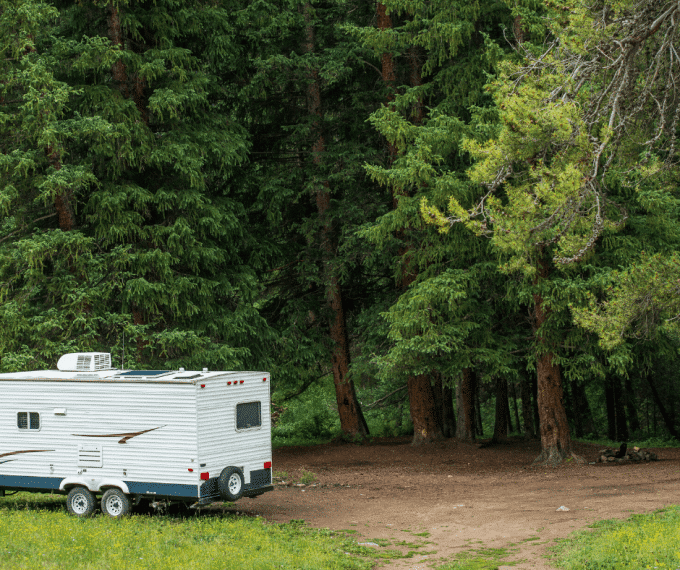
He shares, “Installing solar panels on your RV provides off-the-grid abilities, while also helping to conserve power use on the grid. Solar panels are great, as they don’t take up a ton of usable space, they stay out of sight, and can help deliver power to your rig when needed, especially in emergency situations.”
If RVing responsibly and getting off the grid is important to you, solar is a great place to start.
Take a look at Keep Your Daydream’s Ultimate RV Solar Setup video before they hit the road to Alaska.
Related Reading: Solar Setup on a Class A RV
6. Check Your Fluids
I have to brag on Todd for a minute here. The biggest reason I believe we didn’t have any disasters the 17 months we traveled full-time is because of how on top of things Todd stayed.
From buying new tires to put on our brand new travel trailer to taking care of repairs before they became a big deal, he made it his goal in life to always make sure our rig and truck were in tip-top shape.
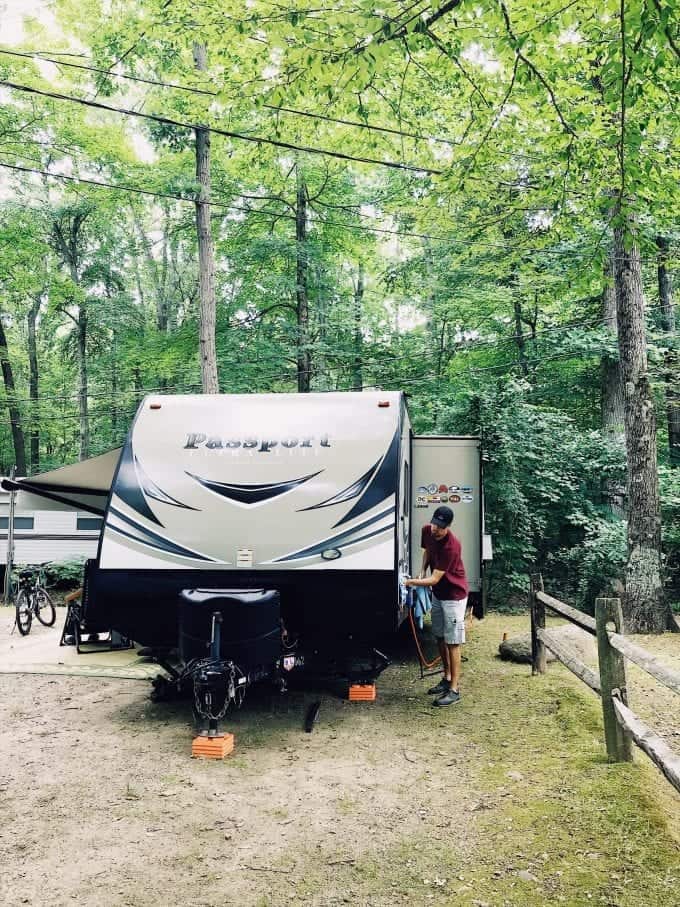
Jake from NuBrakes Mobile Brake Repair shares one thing RVers should definitely stay on top of for both environmental reasons and staying safe on the road and that’s checking your fluids.
He says, “Another thing all travelers should do regardless of the environmental impact, is check their RV’s fluid levels and braking systems.
“Whether you’re hauling a fifth wheel or driving a diesel pusher, a properly maintained engine and brake system ensure you and those around you will stay safe on the road, while also diminishing the chances that a faulty system doesn’t leak unnecessary fluids at campsites while it sits overnight.”
7. Use Public Transportation
If you pull your rig with a huge truck as we did, then you know how frustrating it can be to navigate small city streets or a new town in your massive vehicle.
Jessica Baker from BoundlessBakers, a full-time RVer, shares how they save fuel (and their sanity) while visiting new places in their RV.
She says, “To reduce fuel use, we use public transportation as much as possible when camped at our destination. It’s a great way to get to see the places we visit, it saves on fuel money, and it means we don’t have to park our one-ton truck in small spaces!”

We agree wholeheartedly with her tip and used public transportation when visiting a lot of cities like New York, Washington D.C., and San Francisco.
Related Reading: RV Travel Guide to Liberty Harbor Near NYC
8. Reuse Camping Spots When Boondocking
If saving money and camping in remote locations sounds like a dream to you, then you will definitely want to do your research when it comes to boondocking.
Marianne who owns Boondocker’s Welcome, as well as another site, Frugal RV Travel, shared a tip with us on how to RV responsibly.
She said, “When boondocking on public land, use only previously-used sites. Obvious signs include a clearing with tire tracks or rocks piled as a fire ring.”
Why clear a new spot on beautiful land, when you can use one that’s all ready to go for you?
If you’re looking for a free overnight stay (with membership) while on your way from one location to the next, we highly recommend checking out a Boondocker’s Welcome membership.
We found a great spot in Canada. Granted it was a parking spot in someone’s driveaway, but they were the nicest people. Believe it or not, that’s probably one of our fondest memories of people we met on the road.
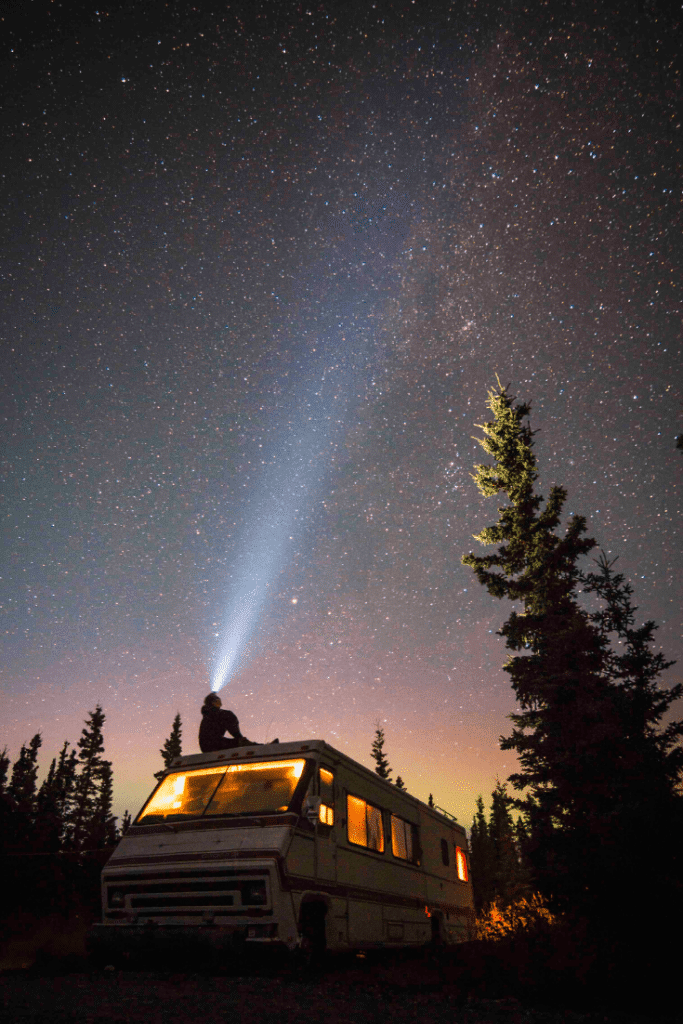
What Do You Do to RV Responsibly?
Whether you decide to install solar, use fewer paper products, or follow any of the tips mentioned above, we hope the ideas inspire ways you can combine your love of RV camping with responsible travel.
Do you have any tips to share? If this is something you do on a regular basis, we would love to hear your tips and tricks.
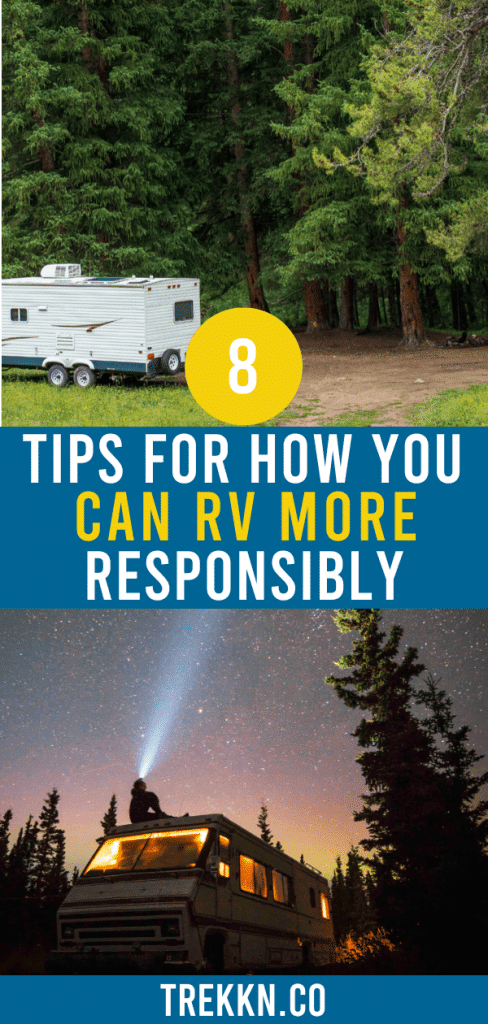

Julie specializes in helping you whip up delicious meals in your tiny RV kitchen, as well as RV organization tips and helping fellow RVers make their RV feel like home. Her favorite RVing spot is in Banff National Park in Canada where yes, the water really is that blue and the people really are that nice.


